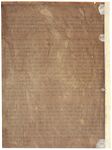HPB-SB-2-2: Difference between revisions
(Created page with "{{HPB-SB-header | volume = 2 | page = 2 | image = SB-02-002.jpg | notes = | prev = 1 | next = 3 }} {{Style P-HPB SB. Title continued|Isis Unveiled|2-1}} her maturity...") |
mNo edit summary |
||
| Line 4: | Line 4: | ||
| image = SB-02-002.jpg | | image = SB-02-002.jpg | ||
| notes = | | notes = | ||
}} | }} | ||
{{Style P-HPB SB. Title continued|Isis Unveiled|2-1}} | {{Style P-HPB SB. Title continued|Isis Unveiled|2-1}} | ||
her maturity among - Hindus, Cingalese, Thibetans, and Egyptians — Oriental traditions, languages, literature and mythology, have long been her chief study and occupation. The immense fund of information stored up during years of thoughtful study and observant travel in all lands, enable her to throw more light upon the esoteric philosophy of eastern nation than, perhaps, any other writer who has contributed to the literature of this important subject. | {{Style P-No indent|her maturity among - Hindus, Cingalese, Thibetans, and Egyptians — Oriental traditions, languages, literature and mythology, have long been her chief study and occupation. The immense fund of information stored up during years of thoughtful study and observant travel in all lands, enable her to throw more light upon the esoteric philosophy of eastern nation than, perhaps, any other writer who has contributed to the literature of this important subject.}} | ||
The work is divided into two volumes one devoted to Science, one to Religion. | The work is divided into two volumes one devoted to Science, one to Religion. | ||
Latest revision as of 11:35, 4 March 2023
< Isis Unveiled (continued from page 2-1) >
her maturity among - Hindus, Cingalese, Thibetans, and Egyptians — Oriental traditions, languages, literature and mythology, have long been her chief study and occupation. The immense fund of information stored up during years of thoughtful study and observant travel in all lands, enable her to throw more light upon the esoteric philosophy of eastern nation than, perhaps, any other writer who has contributed to the literature of this important subject.
The work is divided into two volumes one devoted to Science, one to Religion.
The author is most careful in stating facts and opinions, always presenting quotations of undeniable authenticity. Numerous translated extracts from the Kabala, the Hermes, the Vedas, etc., are interspersed through the work, bearing at times upon themes treated by high authorities, whom she is often obliged to criticise. Among the subjects dilated upon, the review of Platonism, the discussion of the "Genesis of Humanity, the Sub merged Continents, the conflicting theories upon the Emigrations of Peoples, the relation of Myths of India, Persia, Scandinavia, Mexico, Peru, and other nations, to modern science and dogma, may be mentioned to give a faint idea of the scope of the work. Startling revelations respecting many physical and psychological phenomena heretofore wrapped in mystery and doubt, frequently occur at once instructing and amusing the reader. It will be remembered with what avidity the public received and devoured a narrative of the acts of the Thugs unearthed by the English authorities in India some years ago. Our author describes, in a charming manner, the marvelous performances of Fakir Magicians and Sheiks, whose “juggling tricks” delude the senses, and force upon the unwilling mine the conviction that the sources of this bewildering magic must not be sought in mere mechanical legerdemain.
To the scholar and the specialist, to the philologist and the archæologist, this work will be a most valuable acquisition, aiding them in their labors and giving to them the only clue to the labyrinth of confusion in which they are involved. To the general reader it will be especially attractive because of its fascinating style and pleasing arrangement, presenting a constant variety of racy anecdote, pithy th..aght, sound scholarship, and vivid description. Mme. Blavatsky possesses the happy gift of versatility in on eminent degree, and her style is varied to suit her theme with a graceful ease refreshing to the reader, who is led without weariness from page to page. The author has accomplished her task with ability, and has conferred upon all a precious boon, whose benefit the scientist as well as the religionist, the specialist as well as the general reader, will not be slow to recognize.
<... continues on page 2-3 >

